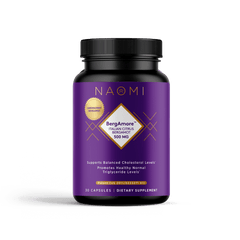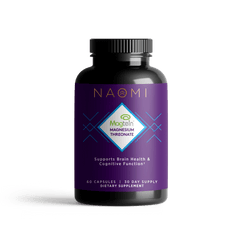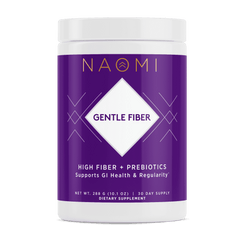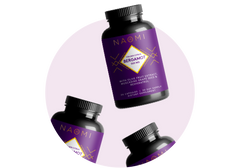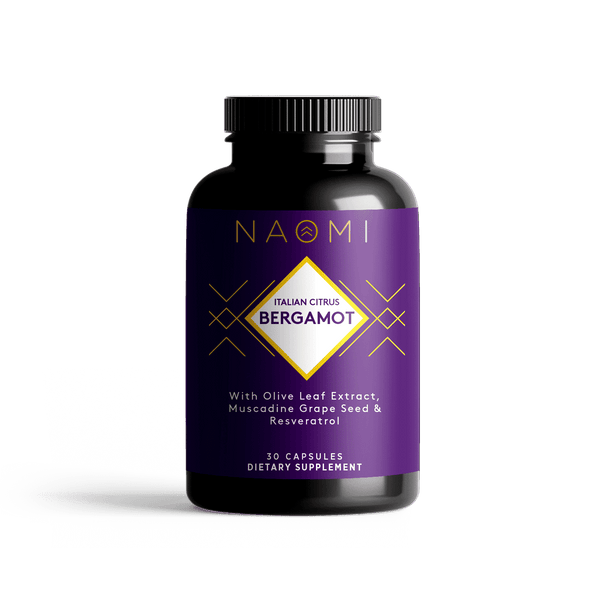The Best Supplements and Vitamins for Women
In my line of work, I’m often asked about the best vitamins for women, which quickly—and frequently—turns into a chat about what vitamins and supplements are best for women to take.
When answering this question about the top vitamins for women, I first consider the person we’re discussing. I’ve always been inspired by the notion that women are nature’s greatest untapped natural resource. By investing our time and energy into the females who surround us, we’re ultimately investing in our collective well-being.
Now, women are unique beings who have unique dietary and nutritional needs. From our pubescent years to our post-menopausal years, our bodies experience significant changes that require proper support in order to maintain optimal function.
While it’s important to eat healthy, nutritious foods, the truth is that we can’t always get all the nutrition we need from our food. Often, we begin to experience symptoms that reveal a greater need, which leads to a pointed search for the best supplements for women.
Let’s take a closer look at why women need to supplement with certain vitamins and minerals to fulfill gaps in their diet and also in which form type what are the best vitamins for women, and even dive into some of the top minerals and more that women need to function at their best.
Why Are Certain Supplements and Vitamins Important to Take Daily for Women?
As a woman goes through her life, she may ask herself several times, “What vitamins and supplements should I take as a woman daily?”—and with good reason.
When contemplating the best vitamins for women, let’s look at the typical lifecycle of a woman.
Throughout her life, a woman’s dietary and nutritional needs change for many reasons. This could be due to hormonal fluctuations, major life changes that impact the external stress placed on her body, or even changes in her health that result in more internal stress, such as high cholesterol, metabolic shifts, or even the development of certain diseases, such as diabetes, heart disease, or autoimmune disease.
I’ve found that the best vitamins for women, and even the best minerals and supplements, vary by age.
For example, if we look at the best supplements for women and consider prepubescent to pubescent girls, they tend to require more calcium for their developing bones and iron during menstruation.
Meanwhile, women in their 20s and 30s are in their peak reproductive years, but they’re also often under quite a bit of stress—something I truly believe is the most underestimated and overlooked threat to both our mental and physical health.
Accordingly, some of the best vitamins for women in their 20s and also for women over 30 tend to be B vitamins, which support fertility and help replenish the B vitamins depleted due to daily stress.
As women shift into their 40s, they begin to consider the outward appearance of aging. As a result, one of the best vitamins for women over 40 is vitamin C. Women are also likely interested in other skin health-supporting supplements, too, such as antioxidant-rich resveratrol along with collagen and astaxanthin, as well as hair-supporting nutrients such as keratin and biotin.
Finally, their 50s, 60s, and beyond, women tend to become more concerned about their immunity. Accordingly, some of the best vitamins for women over 50 are the very same as the best vitamins for women’s immune systems: vitamins C and D. The mineral zinc also comes into play here as well, since numerous studies have shown that it’s a powerhouse nutrient for supporting immune health.
These examples are by no means extensive, but they serve as an example for how the female body and its nutritional requirements change over time.
Now, I believe taking a high-quality multivitamin in addition to eating a nutrient-rich diet high in good fats is essential for every woman’s health and well-being. Why? This will help prevent deficiencies and fill the inevitable nutritional gaps that occur even in the healthiest of diets.
The best multivitamin for women is a comprehensive and complete high-quality multivitamin mineral complex, and I recommend making this the foundation of any supplement regimen.
So, what, specifically, should you look for in a multivitamin? Let’s review some of the best vitamins for womenalong with the best mineral to look for in your multivitamin. Then, we’ll review additional supplements for women to support your health goals.
The 4 Best Vitamins for Women
So, what are the best vitamins for women? By no means is this list exhaustive; that said, it’s a great start to help you best support your body’s nutritional needs.
1. Vitamin C
Do you often wonder, “What vitamins should I take?” One of the best places to start is by eating vitamin C-rich foods and taking a quality multivitamin that contains a gentle non-acidic form of vitamin C, such as calcium ascorbate. Quite simply, vitamin C is one of the best daily vitamins for women to consume.
Here’s why: Not only is the water-soluble vitamin C a required nutrient for more than 300 metabolic functions in your body, including for the biosynthesis of collagen, L-carnitine, and specific neurotransmitters, but it also functions as a powerful antioxidant that fights free radicals and helps to protect you from toxins.
Vitamin C Foods: Citrus fruits, strawberries, tomatoes, bell peppers, cruciferous vegetables such as broccoli and cauliflower, cantaloupe, kiwi, and red cabbage
Recommended Daily Intake: 180 to 270mg
Who Needs It the Most: Vitamin C is one of the top vitamins for women because it’s known to both support immune health and act as a building block for collagen. Accordingly, women who want to support their immunity and skin health could benefit greatly from supplementing with vitamin C.
2. Vitamin D
Next in the list of best vitamins for women is the fat-soluble vitamin D, which is one of the most common nutritional deficiencies affecting women today, impacting approximately 75 percent of American teens and adults.
So, why is this happening? Vitamin D isn’t readily available in a variety of foods and, with the exception of mushrooms, is not found in any plant-based foods. And to make matters worse, the regular use of sunscreen often prevents the ability to make up for shortfalls you would otherwise fulfill through daily sun exposure.
That’s particularly troublesome for women, who can experience a myriad of symptoms and concerns from vitamin D deficiency, such as fatigue, lowered estrogen levels, brain fog, impaired bone integrity, insulin resistance, impaired immune health, and insomnia.
When sourcing your vitamin D, it’s very important to always look for Vitamin D in its D3 natural form (cholecalciferol), which is more bioavailable than the inferior D2 form you’ll find in many lower-cost options.
Vitamin D Foods: Fatty fish such as salmon or tuna, fortified full-fat dairy, and egg yolks
Recommended Daily Intake: a minimum of 600 IU (up to 5,000 IU for those seeking increased immune support)
Who Needs It the Most: Those at risk of developing osteoporosis, want to support immune health (especially during cold and flu season), have been diagnosed with irritable bowel disease (IBD), or are classified as obese benefit the most from vitamin D.
3. Vitamin A
Fat soluble vitamin A comes in two forms: retinol found in animal sources such as full-fat dairy products and meats and beta carotene found in colorful plant-based foods.
So, why did vitamin A make it into the four best vitamins for women? First, vitamin A has been shown to support skin regeneration by slowing the breakdown of collagen in the skin. But that’s not all.
This health-supporting vitamin is also known to support immune health, bone integrity, vision, and even gut health!
Vitamin A Foods: Full-fat dairy, beef liver, leafy greens, tomatoes, carrots, sweet potatoes, pumpkins, squash, red bell peppers, cantaloupes, and mangos
Recommended Daily Intake: 700 to 1,500 mcg RAE
Who Needs It the Most: Women who benefit the most from vitamin A include those who are pregnant or breastfeeding, as more of their nutrients are diverted to the life they’re sustaining. But because vitamin A is essential for both eye and skin health, it’s an essential vitamin for all women. Because high doses of retinyl palmitate have been associated with bone fractures, I recommend taking beta carotene, which your liver will metabolize into vitamin A.
4. B Vitamins
Last in our list of top women’s vitamins is the group of B vitamins. This group refers to several different nutrients:
- B1 (thiamin)
- B2 (riboflavin)
- B3 (niacin)
- B5 (pantothenic acid)
- B6 (pyridoxine)
- B7 (biotin)
- B9 (folate)
- B12 (cobalamin)
These nutrients play vital roles in women’s health by supporting proper cortisol output (cortisol is often called the stress hormone, and it’s produced by your adrenal glands in response to stress).
Additionally, B vitamins support your body’s cellular energy, act as antioxidants, support brain development in children, support skin integrity, promote detoxification, and even support quality sleep. It’s easy to see why B vitamins are some of the best vitamins for women, isn’t it?
B Vitamin Foods: Fatty fish, beef liver, eggs, full-fat dairy, nuts and seeds, oats, leafy greens, beans, and fresh fruit
Recommended Daily Intake:
- B1: 1.1 mg to 6mg
- B2: 1.1 mg to 6.5mg
- B3: 14 to 32 mg NE
- B5: 5 to 50mg
- B6: 1.3 to 8.5 mg
- B7: 30 to 1000 mcg
- B9: 400 mcg DFE
- B12: 2.4 to 24 mcg
Who Needs It the Most: An essential vitamin for everyone, B vitamins are especially good for women who are pregnant or breastfeeding, but I also recommend a B complex vitamin to women who are under chronic stress. Additionally, B vitamins support mood and energy levels by increasing serotonin production, which is important during menopause.
The Top 4 Minerals for Women
I want to take a quick moment to discuss some of the top minerals for women before we move onto the best supplements for women.
The first two minerals listed can be sourced in a multivitamin while the last two should be taken separately, as you require more of them that can be readily available in a multi.
1. Iron
Iron is a trace mineral required by the body to aid in carrying oxygen via your blood to the rest of your body. It’s also essential for making certain hormones. Unfortunately, iron-deficiency anemia is a common diagnosis in women, especially those who are menstruating or pregnant.
It’s important to note that iron can lead to GI upset and irritation, so I only use a special form that is gentle and non-constipating called iron bisglycinate or Ferrochel®.
Recommended Daily Intake: 12 mg, ranging from 18 mg for pre-menopausal women to 8 mg for post-menopausal women; pregnant women require 27 mg
Who Needs It the Most: Women who are pregnant or menstruating often require more iron, and this is especially true for teenage girls. In fact, 20 percent of women under 50 are iron deficient.
2. Zinc
Zinc is one of the most abundant trace minerals in the body, second only to iron. Zinc is primarily known for its immune-supporting and inflammation-cooling benefits, largely due to its antioxidant properties.
Recommended Daily Intake: 8 to 33mg
Who Needs It the Most: According to numerous studies, zinc is highly effective in supplemental form during times of illness, and specifically during the cold and flu season. As a result, those who are fighting a viral illness or looking to support their immune health may be interested in supplementing with zinc. It’s also known to support hair and skin health, eye health, and even fertility!
3. Magnesium
Magnesium is responsible for at least 800 essential roles within the body, making it an essential trace mineral (meaning it’s required in small amounts but still necessary for optimal body function). It helps to relax muscles and relieve tension unlike anything else, which is why I take it each and every day. Plus, it’s required to maintain healthy blood sugar levels, blood pressure, and more.
Recommended Daily Intake: 310 to 320 mg
Who Needs It the Most: Those who are concerned about their cardiovascular health and blood sugar levels should pay close attention to their magnesium levels. For best absorption, look for magnesium glycinate or magnesium malate and avoid magnesium oxide.
4. Calcium
Calcium is a macro mineral your body needs in fairly large amounts in order to support bone health. In fact, it’s the most abundant macro mineral in the human body, with more than 99 percent of it stored in our bones.
Recommended Daily Intake: 1,000 mg; 1,200 mg for those over age 50
Who Needs It the Most: As women age, we tend to require more calcium to support our bone integrity. It’s also important for females under 18 and in women who are pregnant or breast feeding to support proper bone growth in fetuses, babies, and children. Be sure to look for a quality chelated form of calcium such as calcium citrate.
The 4 Best Supplements for Women
In my opinion, the best supplements for women are those that feature the cleanest, purest ingredients in their most potent forms. Here are a few of my personal favorites that I not only use on a regular basis but also recommend to the women in my life.
1. Collagen
Collagen is the most abundant protein in the human body, making up 30 percent of the protein in your body. It’s found in your muscles, tendons, bones, blood vessels, digestive system, and skin. I often describe collagen as the glue that keeps your skin strong yet elastic.
When it comes to supplements, they’re created from a variety of sources, including eggs, chicken, beef, pig, and fish. As such, each source provides different amounts of the various types of collagen.
Personally, I recommend using only the most potent supplements possible, so that you get maximum effects. That’s why I created NAOMI Ultra Collagen Renew, which offers 30 times the concentration of collagen peptides!
Who Needs It the Most: After age 30, collagen steadily declines at a rate of about 1 to 2 percent each year. And this decline accelerates after age 50, with women losing about 30 percent of their total collagen during menopause. So, women searching for a source of glowing skin and looking to support their overall skin integrity stand to benefit the most from collagen.
2. Citrus Bergamot
When it comes to the best supplements for women, citrus bergamot deserves a place in every medicine cabinet across the world! Why? This “superfruit” has been shown to not only support healthy cholesterol levels but also support a healthy HDL (good cholesterol) to triglyceride ratio—a factor that’s five times more predictive of serious heart issues than the level of LDL!
Additionally, this amazing fruit also helps to maintain a healthy balance in your HDL and LDL levels while supporting healthy blood sugar levels.
Sourced from the powerful fruit grown only in Calabria, Italy, NAOMI Citrus Bergamot differs from other bergamot supplements because it uses the entire fruit to provide an array of nutrients and polyphenols at the precise levels used in gold standard, double-blind, placebo-controlled research.
Who Needs It the Most: Women concerned about their cholesterol levels, as well as those with elevated levels of triglycerides and/or blood sugar will benefit most from this antioxidant-rich supplement.
3. Astaxanthin
Astaxanthin is a rare, deep red-colored carotenoid found in microalgae that’s believed to be the most powerful antioxidant in nature. In fact, scientific research has confirmed that it’s 6,000 times stronger than vitamin C in terms of its antioxidant properties!
Due to this high antioxidant activity, astaxanthin has been scientifically shown to be effective against singlet oxygen, which is a particularly dangerous free radical known to cause damage throughout the body. Astaxanthin is also known to help support skin health from the inside-out, particularly in terms of UV oxidative stress.
Who Needs It the Most: Because free radicals can wreak havoc in your body, women who are looking to support their overall health will benefit most from astaxanthin.
So, whether you’re looking to support the health of your joints, brain, heart, or eyes—or even if you’re looking to help protect your skin or support your immunity, the NAOMI Extra Strength Astaxanthin is a great supplement to turn to.
4. Spicefruit GloSlim + StressAdaptTM
One supplement I’m extremely passionate about is NAOMI Spicefruit GloSlim + StressAdapt. Here’s why: Spicefruit is an antioxidant-rich plant grown in West Africa that’s been known to support metabolic health. Additionally, research in human trials has also demonstrated its ability to significantly reduce weight as well as inches. It also supports healthy blood sugar levels as well as your body’s response to stress.
Spicefruit GloSlim + StressAdapt features 300 mg of the proprietary SpiceFruit formula and adaptogen herbs, which have been scientifically shown to support healthy levels of cortisol.
Who Needs It the Most: Women looking to support their metabolic health and those concerned with higher blood sugar levels and high stress levels would benefit most from this supplement.


